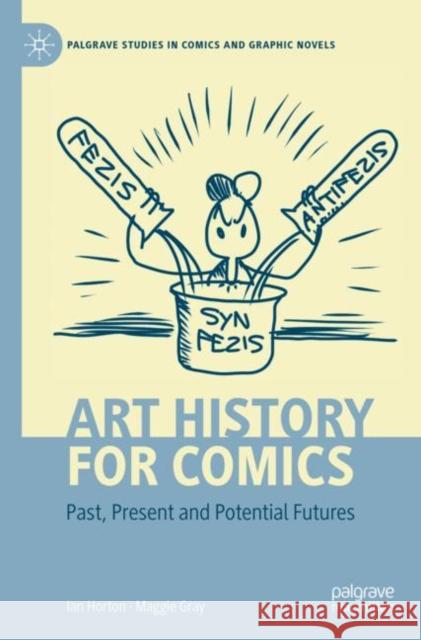Art History for Comics » książka



(netto: 191,21 VAT: 5%)
Najniższa cena z 30 dni: 192,74
ok. 22 dni roboczych.
Darmowa dostawa!
Why Does Comics Studies Need Art History (and Vice Versa)?.
Disciplinary and Methodological Concerns.
Part I: The History of Art History and Comics Studies.
Part II: Possibilities for Comics Art History Now.
References.
Part I The History of Art History and Comics Studies.
Establishing Canons, Styles and Schools at the Dawn of Comics Studies.
Creating Classical Canons.
Defining Styles and Schools.
References.
Iconography and Cultural History in Comics Studies.
Iconography as Method and Methodology.
Cultural History as a Critical Framework.
References.
Art History Turned Upside Down: David Kunzle and the Social History of Art.
Volume 1: Exe⁄orcising Gombrich.
New Left Art History.
How Karl Marx Prevailed over Carl Barks.
Volume 2: The Social History of Comics.
References.
Variations of Formalism, Modernism, Abstraction.
Claude Moliterni: A Formalism of Narrative Technique.
Gerald Gassiot-Talabot: Comics Against Formalism and Abstraction?.
Comics (and the) Modernist Avant-Garde.
Andrei Molotiu: Abstract Comics Formalism.Abstraction Beyond Modernist Formalism.
References.
Part II Possibilities for Comics Art History Now.
Challenging Canons and the Challenge of Style: Visualising the Baroque Storyworld of Judge Dredd’s “The Cursed Earth”.Contesting Canons in Comics Studies.
The Challenge of Style for Comics Studies.
Styles and Schools as Canonical Markers.
Picturing a Baroque Storyworld: Seeing “The Cursed Earth” Through Wolfflin’s Comparative Methodology.
The Limits and Potential of Wolfflin’s Analysis of Style for Comics Studies.
References.
Iconography for Comics Studies Reconsidered: Interpreting Visual Transformations in Jack Kirby’s The Mighty Thor.From Iconography to Iconology.
The Semiotic Turn in Art History (and Comics Studies).
Thump, Karrrack! The Iconology of Transformation in Thor.The Challenge of Iconography and Iconology for Comic Studies (and Art History).
References.
Cultural History for Comics Studies: Reinterpreting the Eagle and “Dan Dare
Pilot of the Future”.
From Iconology to Cultural History.
The Discourse of Cultural Studies Within Comics Studies.Recontextualising the Eagle and “Dan Dare
Pilot of the Future”.
Daring to Use Cultural History in Comics Studies.
References.
A Social History of Comics Art: Looking at Writers and Readers’ Capitalism for Beginners.
Marxist Art History and Comics.
Style, Ideology and Class.
Ideology and Autonomy.
Affect, Materiality and Ways of Reading and Seeing.Writers and Readers ... for Beginners Comic Books.
Relations of Production, Distribution and Consumption.
Style, Materiality and the Politics of Form.
Ways of Reading and Looking.
References.
Re-framing the Avant-Garde: Different Ways of Seeing Escape.Positioning the Avant-Garde in Comics Studies.
Unpopular Culture and Postmodern Modernism.
Framing the Avant-Garde in Art History.
Advancing Towards the Picture Plane.Advancing Against Art and into Life.
Advancing as Reaction and Repetition.
Advancing Beyond the Frame.
Escape Artistry.Reading Escape as Unpopular Culture.
Small Press and Alternative Avant-Gardes.
A Mainstream Alternative.
Putting Comics Studies in the Frame.
References.
Modernism and Comics Revisited: Form and Fragmentation in Alan Moore’s “I Can Hear the Grass Grow”.
Comics and Modernism.
Modernism in Art History.
The Significance of Form.The Specificity of Medium.
The Defence of Autonomy.
The Occlusions of Modernist Criticism.
Reframing Modernism and Comics.
I Can Hear the Grass Grow.
Form: The Abstract Underscore, Medium and Modernism.
A Medium of Fragments: Modernity, Montage and the Politics of Form.
References.
Conclusion: Future Directions.References.
Index.
Ian Horton is Reader in Graphic Communication and a founder member of the Comics Research Hub (CoRH!!) at the University of the Arts London, UK. He is associate editor of the Journal of Graphic Novels and Comics and his research focuses on comic books, graphic design and illustration.
Maggie Gray is Senior Lecturer in Critical & Historical Studies at Kingston University, UK, specializing in comics, cartooning, and visual narrative. She is author of Alan Moore, Out from the Underground: Cartooning, Performance and Dissent (Palgrave Macmillan, 2017).
This book looks at comics through the lens of Art History, examining the past influence of art-historical methodologies on comics scholarship to scope how they can be applied to Comics Studies in the present and future. It unearths how early comics scholars deployed art-historical approaches, including stylistic analysis, iconography, Cultural History and the social history of art, and proposes how such methodologies, updated in light of disciplinary developments within Art History, could be usefully adopted in the study of comics today. Through a series of indicative case studies of British and American comics like Eagle, The Mighty Thor, 2000AD, Escape and Heartbreak Hotel, it argues that art-historical methods better address overlooked aspects of visual and material form. Bringing Art History back into the interdisciplinary nexus of comics scholarship raises some fundamental questions about the categories, frameworks and values underlying contemporary Comics Studies.
Maggie Gray is Senior Lecturer in Critical & Historical Studies at Kingston University, UK.
1997-2026 DolnySlask.com Agencja Internetowa
KrainaKsiazek.PL - Księgarnia Internetowa









